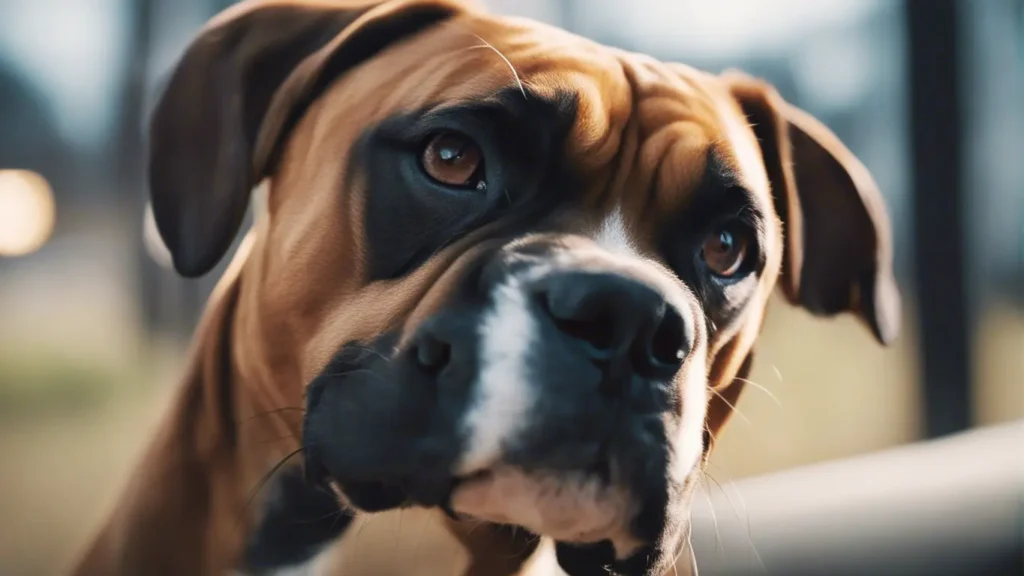With their muscular physique, square-jawed heads, and enthusiastic personalities, Boxer dogs have charmed their way into the hearts of dog lovers worldwide. But beneath their charming exteriors lies an energetic, intelligent, and occasionally mischievous spirit that needs plenty of activity and attention.
To truly understand the Boxer, one must delve deeper into their unique origins, physical traits, temperament quirks, training needs, health considerations, and specialized care requirements. This comprehensive guide will unravel the mystery behind these charismatic canines and provide essential insights for current or prospective Boxer owners.
Table of Contents
- 1 Origins: From Cattle-Driving to Loyal Companionship
- 2 Physical Characteristics: An Impressive Blend of Power and Personality
- 3 Personality and Temperament: The Devoted Companion
- 4 Specialized Care Needs: An Active Breed Requires Extra Attention
- 5 The Bright Side: Why Boxers Make Great Companions
- 6 Caring for a Boxer: Their Key Lifestyle Needs
- 7 Helpful Training Tips For Boxers
- 8 The Boxer Personality: Getting to Know This Mischievous Breed
- 9 What’s Best For Boxers: Lifestyle Considerations
- 10 Related posts:
- 11 The Boxer Dog Temperament: All You Need to Know
- 12 Boxer Puppies (25 Beautiful Boxer Babies)
- 13 Beautiful Boxer Dogs (27 Amazing Pics)
Origins: From Cattle-Driving to Loyal Companionship
The Boxer’s journey began in 19th century Germany, where they were initially developed as working dogs to herd, drive, and control cattle. Their ancestry includes the now-extinct Bullenbeisser, a Mastiff-type breed crossed with local German hunting breeds such as the Deutsche Bracke. The result was a powerfully built yet agile dog adept at managing and directing even the most stubborn cattle.

As modes of cattle transportation advanced, the need for cattle-driving dogs declined substantially by the late 19th century. However, Boxers were then bred as guard dogs and gained popularity in dog fighting contests, which were legal entertainment spectacles at the time.
Thankfully, increased animal welfare activism led to bans on such brutal blood sports across Europe. This allowed the Boxer breed to evolve into the affectionate family companion we know gradually and love today.
The American Kennel Club first registered the Boxer breed in 1904. Still, they gained widespread popularity after World War II when returning soldiers introduced the dogs to the United States after being stationed in Europe. Today, Boxers consistently rank within America’s top 10 most popular breeds and remain beloved canine companions worldwide.
Physical Characteristics: An Impressive Blend of Power and Personality
One glance at a Boxer dog and their physical distinctiveness is apparent. Their sturdy yet agile build features a compact, muscular frame, square-cut muzzle, strong jaws, folded-over ears, and an alert expression emphasized by their dark brown eyes. Their signature smooth, short-haired coats tightly adhere to their bodies with colors ranging from fawn to brindle.

Male Boxers typically stand 22.5 to 25 inches at the shoulder and weigh around 65 to 80 pounds. Females range from 21 to 23.5 inches tall and weigh approximately 50 to 65 pounds. Their imposing physicality hints at these dogs’ strength and grace as cattle herders.
Yet beneath their brawn lies an endearingly goofy spirit. Boxers frequently exhibit clownish behaviors such as play-bowing while waving their front legs, foot-tapping when excited, or presenting a favorite toy while tilting their heads. This blend of impressive power and silly charm makes Boxers so universally adored.
Personality and Temperament: The Devoted Companion
The Boxer is legendary for its people-oriented temperament and unwavering loyalty once bonds have formed. They thrive on constant companionship and seek to remain by their owner’s side as much as possible. For this reason, Boxers are prone to separation anxiety if left alone for extended periods. Providing puzzle toys stuffed with treats or hiring neighborhood dog walkers are great ways to combat boredom and prevent destructive behaviors when you can’t be home.
Despite their protective instincts towards family members, proper socialization allows Boxers to become famously trustworthy and gentle around children. Early obedience training helps reinforce good manners and prevents issues like jumping up, mouthing, or accidentally knocking over little ones with their energetic antics.

In regards to energy, Boxers have it in spades! Prospective owners should be prepared for epic play sessions, enthusiastic greetings at the door, and a canine companion who wants to participate in all aspects of family life. A well-exercised Boxer will be a calm and content Boxer at home. Engaging their bodies and minds through interactive games, long daily walks, jogs, swimming, or dog sports like agility and rally obedience helps satisfy their needs.
Additionally, while male Boxers can be more dominant around other unknown dogs, early and ongoing socialization helps them learn tolerance, appropriate play skills, and manners for canine housemates. Multi-pet homes with cats or other animals are also possible by slowly introducing a Boxer to the other residents while rewarding calm interactions.
Specialized Care Needs: An Active Breed Requires Extra Attention
Before welcoming a Boxer into your home, prospective owners should honestly evaluate if they can adequately devote the time and energy required to care for this active, high-maintenance breed. Boxers need plenty of exercise and mental stimulation to be happy, healthy companions. They need to do better in ignored or neglected environments.

Additionally, potential health conditions like cancer, heart disease, joint dysplasia, allergies, and neurological issues are prevalent in the breed. As a result, regular veterinary care is essential, and owners must be financially and emotionally prepared to manage these potential medical needs.
Key Exercise Requirements
As a high-energy working breed, Boxers need at least 60-90 minutes of vigorous physical activity daily. This can include long walks, jogging, hiking, swimming, playing fetch, or participation in canine sports like agility, flyball, or obedience training. A fenced backyard is a great asset but does not replace the need for structured exercise through leashed walks, which provide mental stimulation.
As rambunctious puppies, limiting exercise to prevent overexertion in still-developing joints is essential. But as adults, Boxers will enthusiastically match any exercise level the owner sets. Interactive toys and food puzzle games provide mental stimulation on days when the weather limits outdoor activities.
Owners should be mindful of overheating and heat stroke risks when exercising Boxers in hot, humid weather due to their brachycephalic faces and short snouts. Always provide cool water before, during, and after outdoor activities or play sessions.
Grooming Requirements
Compared to many high-maintenance dog breeds, Boxers are relatively easy to groom. Their short, close-fitting coats have a sleek, shiny appearance. Occasional brushing with a rubber grooming mitt or soft bristle brush removes loose hair and promotes skin and coat health through blood circulation and oil distribution.

Beyond weekly brushing, Boxers only require bathing on an as-needed basis using a mild canine shampoo. Bathing too frequently can dry out their skin. Carefully dry any skin folds around their face, lips, and tail pocket area after a bath to prevent moisture buildup that can cause infections.
Additionally, pay close attention to cleaning facial wrinkles daily using a damp cloth to prevent bacterial infections within skin folds. Ears should be checked weekly for cleanliness and signs of infection, as Boxers are prone to developing yeast and bacterial infections in their floppy ears that require medication to resolve.
Brushing teeth two to three times per week is imperative for dental health, and nails should be trimmed monthly. Owners should also regularly check their Boxer for any unusual lumps, bumps, or skin changes that may indicate a medical issue requiring veterinary attention.
Ideal Home Setup
The ideal living situation for a Boxer dog is an active household with family members who have flexible schedules and can provide consistent attention, exercise, and training. Their strong prey drive makes cohabitating with small pets like rabbits or guinea pigs difficult, so a home without little critters freely roaming is preferable.

A securely fenced backyard provides ample room for play and zooms, but it is optional if daily leashed walks are guaranteed. Apartment living can work well when owners commit to providing daily mental and physical stimulation. However, solitary backyard living with little human interaction should be avoided, as Boxers thrive when they can be close to their treasured people.
Boxers should not spend prolonged periods left alone or isolated in a crate or room to discourage loneliness, anxiety, and destructive behaviors. Providing puzzle toys stuffed with treats can help occupy them for brief periods until a family member returns. Some owners even bring their Boxers to work, where they happily snooze under an office desk or greet customers in pet-friendly establishments.
Common Health Issues to Be Aware Of
Unfortunately, Boxers are prone to various health conditions that prospective owners should thoroughly research to find responsible, health-tested breeders. Some prevalent health issues include:
- Cancer: Boxers have concerningly high rates of brain tumors, mast cell tumors, and lymphosarcoma compared to other breeds. Regular veterinary exams help detect lumps or changes early on.
- Heart Disease: Approximately 10% of Boxers will develop a potentially fatal heart condition such as cardiomyopathy or irregular heart rhythms at some point. They see a canine cardiologist annually for exams and EKG screens for problems before symptoms arise.
- Joint Dysplasia: Hip and elbow dysplasia are common orthopedic conditions in Boxers due to their athleticism and rate of bone growth. Maintaining lean body weight, providing joint supplements, and avoiding overexertion help reduce pain and mobility issues.
- Allergies: Food allergies may cause itchy skin, chronic ear infections, vomiting, or diarrhea. Identifying and eliminating the triggering ingredients from their diet is vital for relief. Inhalant allergies to things like pollen may also cause issues.
- Neurological Disorders: Conditions like epilepsy, dementia, and tremors have been reported. Symptoms often don’t appear until later in life. Anticonvulsant medications can help control seizures.

Veterinary care is essential to maximizing a Boxer’s lifespan and quality of life. Owners should be financially and emotionally prepared to provide ample preventative care to screen for disease and adequately manage these breed-specific chronic health issues.
The Bright Side: Why Boxers Make Great Companions
While Boxers certainly have specialized needs, their devotion and unique personalities make them rewarding companions for the adequately prepared owner able to provide adequate care.
Despite their large size, Boxers think they are lap dogs and will happily cuddle up with their adored people. They form powerful bonds with a family that will bring joy for years.
Boxers become excellent canine citizens with proper training. Their people-pleasing nature, intelligence, and desire for a purpose means they excel in obedience competition, therapy work, or police and military service.
This breed naturally craves structure and transparent leadership. Boxers blossom and exude contentment when owners provide predictable routines, regular exercise, firm boundaries, and clear communication.

The Boxer’s loyalty and protective instincts make them vigilant watchdogs who will valiantly defend their family from perceived threats. But their fun-loving silly streak also delights households with constant comedic entertainment.
In short, Boxers can make outstanding family pets for owners able to commit to their specialized care needs fully. Their antics and affection create a memorable, lifelong bond.
Caring for a Boxer: Their Key Lifestyle Needs
Providing the best life possible for a beloved Boxer requires understanding and meeting the breed’s essential care needs across all life stages:
- Nutrition – High-quality commercial dog foods specially formulated for large, active breeds provide complete, balanced nutrition without excess calories that lead to obesity. Limit treats and avoid overfeeding.
- Exercise – At least 1-2 hours of daily vigorous exercise such as jogging, hiking, swimming, or active play is crucial. Maintain reasonable exercise levels for puppies under 18 months old.
- Training – Early socialization and positive reinforcement training ensure good manners. Seek professional help with significant behavior issues. Practice basic commands daily.
- Grooming – Weekly brushing, regular nail trims, dental cleaning, wrinkle and ear cleaning, and periodic bathing keep their smooth coat and skin healthy.
- Health – Schedule annual vet exams, dental cleanings, heart/cancer screenings, bloodwork, and preventatives like flea/tick medication. Enroll in pet insurance for added financial protection. Keep vaccinations current.
- Mental Stimulation – Prevent boredom with food puzzle toys, chew bones, changing up walking routes, allowing sniffing on walks, and learning new tricks or dog sports.
- Companionship – Spend quality time together playing, cuddling, and participating in family life. Don’t isolate them from family bonding. Provide care when away.
- Safety – Use a well-fitted harness and leash for walking to prevent escape and choking risks. Keep household toxins locked away and always supervise small children.

Implementing these best practices throughout each life stage, from exuberant puppyhood to mature adult years, allows Boxers to live their healthiest, happiest lives as cherished family members.
Helpful Training Tips For Boxers
The Boxer is an intelligent, high-energy breed that thrives with plenty of mental and physical stimulation. Here are some helpful training tips:
- Start socialization and training early. Begin exposing your Boxer puppy to new sights, sounds, people, and other dogs in a positive way starting at 7-8 weeks old to prevent fearfulness or aggression later in life. Sign up for formal obedience classes by four months old.
- Use positive reinforcement. Food rewards, praise, and play motivate Boxers to cooperate and boost training success. Never use harsh corrections or punishment, which can cause stubbornness or aggression.
- Keep training sessions short and upbeat. Boxers have short attention spans. 5-10 minute sessions interspersed throughout the day maintain their interest and enthusiasm for learning. End on a positive note.
- Practice consistency and patience. Boxers excel with clear, consistent direction and kind patience when learning new skills. Set household rules and stick to them.
- Practice obedience skills daily. Reinforce commands like sit, stay, come, down, heel, and no constantly throughout the day during play, walks, and routine activities to prove excellent manners.
- Crate train properly. Crate training utilizes a dog’s natural denning instinct to create a safe space and prevents destructive chewing or potty mishaps when alone. However, puppies should not be crated for extended periods.
- Discourage jumping. Jumping up can be dangerous and scary, especially for small children. Teach four on-the-floor manners and reward when all paws stay on the ground.
- Socialize appropriately. Well-socialized Boxers thrive in family settings. Supervise all interactions with children and educate kids on safe dog handling. Arrange controlled play dates with other vaccinated puppies and tolerant adult dogs.

The Boxer Personality: Getting to Know This Mischievous Breed
The Boxer is a complex canine with many layers beneath its fun-loving, mischievous exterior. Here’s what makes this breed tick:
- Energetic spirit – Boxers have bountiful energy reserves. When not given adequate outlets like exercise, training, or playtime, their enthusiasm manifests in mischiefs like destructive chewing, digging, or hyperactivity. Meeting their needs keeps them calm.
- People-focused devotion – Boxers bond intensely with their families. They aim to be close to their people as much as possible and may develop separation distress if isolated. Including them in family activities makes them feel secure.
- Protective instincts – Boxers take their role as guardians seriously, and most exhibit some wariness around strangers approaching the home. However, unwarranted aggression is atypical, and socialization helps them discern everyday threats from harmless incidents.
- Goofball antics – Few breeds delight owners as much as the Boxer does with their clownish behaviors. Play bowing while “boxing,” presenting a beloved toy, foot tapping when excited, or leaning their heads make this breed endlessly amusing.
- Mental sharpness – Beneath their silly exterior lies an intelligent, alert mind. Boxers thrive when challenged mentally through training sessions, food puzzles, new experiences that allow them to problem solve, and responsible off-leash freedom.
- Strong work ethic – This capable working breed aims to please its owner and enthusiastically tackles any task presented to them. They excel at canine sports, therapy roles, obedience competitions, or energetic activities alongside their favorite human.
- Loyalty – The Boxer’s devotion to its family knows no bounds. They stick by their owner’s side through thick and thin, ready to face any challenge or adventure side by side. That faithful spirit stays true throughout their lifetime.

Boxers will constantly entertain households with their antics and dignified snoozing poses. But don’t let that easygoing homebody demeanor fool you. When playtime or adventure calls, they readily answer the summons to join the action!
What’s Best For Boxers: Lifestyle Considerations
Before welcoming a Boxer into your home, ensure your lifestyle can provide what this energetic but sensitive breed needs to thrive:
- Active owners – Couch potatoes and the overly sedentary should consider lower essential breeds. Boxers flourish with owners who enjoy vigorous exercise like hiking, running, cycling, or swimming. Interactive games help satisfy their needs.
- Dog experience – First-time owners may become overwhelmed with the Boxer’s exuberance. Those able to patiently train through puppy antics or confident handling adult rescues build a better bond.
- Time and commitment – Boxers thrive on companionship. Owners working long hours away may return home to chaos and stress. Boxers do best with plenty of togetherness.
- Training dedication – Early socialization and continued obedience training are a must. Boxers excel with a job to do. Signing up for a sport like agility or rally strengthens the human-canine bond.
- Stimulation – Inquisitive Boxers need both mental and physical exercise. Vary their routes, allow sniffing on walks, and provide interactive puzzle toys and chews. Learning keeps boredom at bay.
- Health vigilant – Boxers are prone to several severe health conditions. Stay on top of vet visits, annual testing, insurance, medication, and finances in case issues arise. Make sure to skim on their wellness.
- Patience and sensitivity – Boxers respond poorly to harsh training methods. Kind, firm leadership keeps their sensitive spirit secure. Yelling or physical corrections lead to mistrust, fear, and potential aggression.
Prospective Boxer owners able to provide this ideal lifestyle will discover the sheer joy that comes from life with these devoted companions.
Boxer dogs hold a special place in their owners’ hearts thanks to their lively, fun-loving personalities and unwavering loyalty. However, bringing one of these energetic canines home is a big commitment not to be taken lightly.

Providing the extensive exercise, training, socialization, and mental engagement Boxers need daily is a full-time job. Their potential health issues also demand vigilant veterinary care and financial preparation. Boxers thrive when included in all aspects of family life as faithful companions.
While their specialized care needs mean Boxers aren’t the right fit for every household, the payoff of sharing your life with one of these devoted clowns can bring immense joy and fulfillment. The critical first step is to thoroughly research the breed and evaluate if your lifestyle is a good match.
If you’re ready to provide a Boxer with the structured outlets they need for all that enthusiasm while also embracing their mischievous antics, you’ll gain a faithful best friend for life. The unmatched bond between a Boxer and its family is genuinely unbreakable. Be prepared for wet kisses, silly antics, and many new adventures together!